非谓语动词详解+例句
- 格式:doc
- 大小:66.00 KB
- 文档页数:9
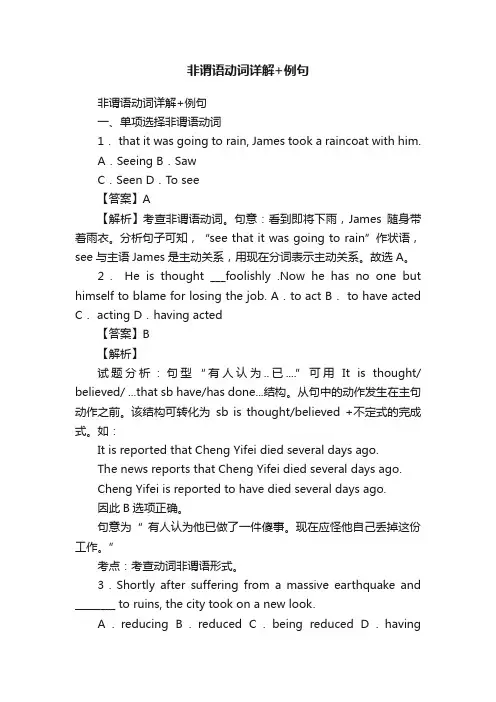
非谓语动词详解+例句非谓语动词详解+例句一、单项选择非谓语动词1. that it was going to rain, James took a raincoat with him.A.Seeing B.SawC.Seen D.To see【答案】A【解析】考查非谓语动词。
句意:看到即将下雨,James随身带着雨衣。
分析句子可知,“see that it was going to rain”作状语,see与主语James是主动关系,用现在分词表示主动关系。
故选A。
2.He is thought ___foolishly .Now he has no one but himself to blame for losing the job. A.to act B. to have acted C. acting D.having acted【答案】B【解析】试题分析:句型“有人认为..已....”可用It is thought/ believed/ ...that sb have/has done...结构。
从句中的动作发生在主句动作之前。
该结构可转化为sb is thought/believed +不定式的完成式。
如:It is reported that Cheng Yifei died several days ago.The news reports that Cheng Yifei died several days ago.Cheng Yifei is reported to have died several days ago.因此B选项正确。
句意为“ 有人认为他已做了一件傻事。
现在应怪他自己丢掉这份工作。
”考点:考查动词非谓语形式。
3.Shortly after suffering from a massive earthquake and ________ to ruins, the city took on a new look.A.reducing B.reduced C.being reduced D.havingreduced 【答案】C【解析】【详解】考查动名词的被动语态。
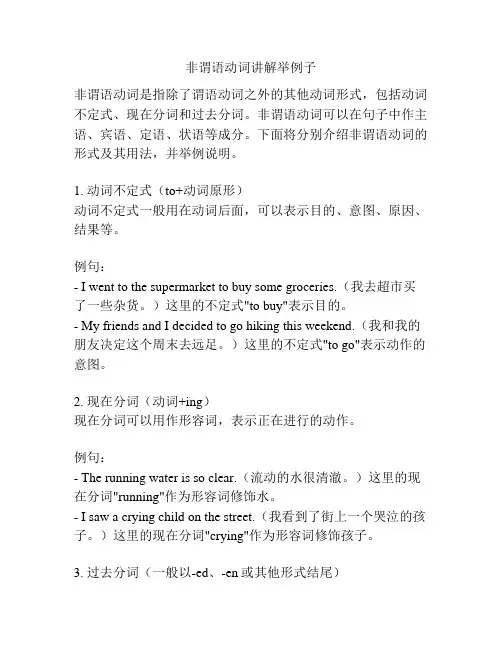
非谓语动词讲解举例子非谓语动词是指除了谓语动词之外的其他动词形式,包括动词不定式、现在分词和过去分词。
非谓语动词可以在句子中作主语、宾语、定语、状语等成分。
下面将分别介绍非谓语动词的形式及其用法,并举例说明。
1. 动词不定式(to+动词原形)动词不定式一般用在动词后面,可以表示目的、意图、原因、结果等。
例句:- I went to the supermarket to buy some groceries.(我去超市买了一些杂货。
)这里的不定式"to buy"表示目的。
- My friends and I decided to go hiking this weekend.(我和我的朋友决定这个周末去远足。
)这里的不定式"to go"表示动作的意图。
2. 现在分词(动词+ing)现在分词可以用作形容词,表示正在进行的动作。
例句:- The running water is so clear.(流动的水很清澈。
)这里的现在分词"running"作为形容词修饰水。
- I saw a crying child on the street.(我看到了街上一个哭泣的孩子。
)这里的现在分词"crying"作为形容词修饰孩子。
3. 过去分词(一般以-ed、-en或其他形式结尾)过去分词一般用作形容词,表示被动或完成的动作。
例句:- The broken window needs to be repaired.(破损的窗户需要修理。
)这里的过去分词"broken"作为形容词修饰窗户。
- She was thrilled to receive the unexpected gift.(她收到这个意外的礼物感到兴奋。
)这里的过去分词"unexpected"作为形容词修饰礼物。
非谓语动词还有其他用法,如作状语、宾语补足语等,下面是一些例子:- Being a doctor, he is always busy.(作状语)作为一个医生,他总是很忙。
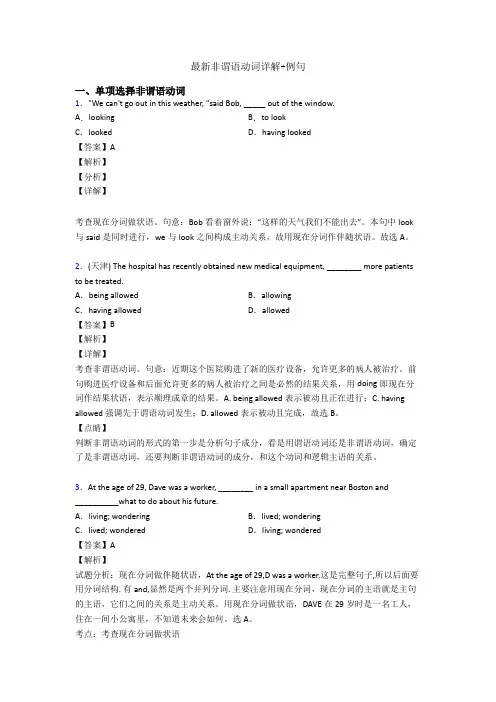
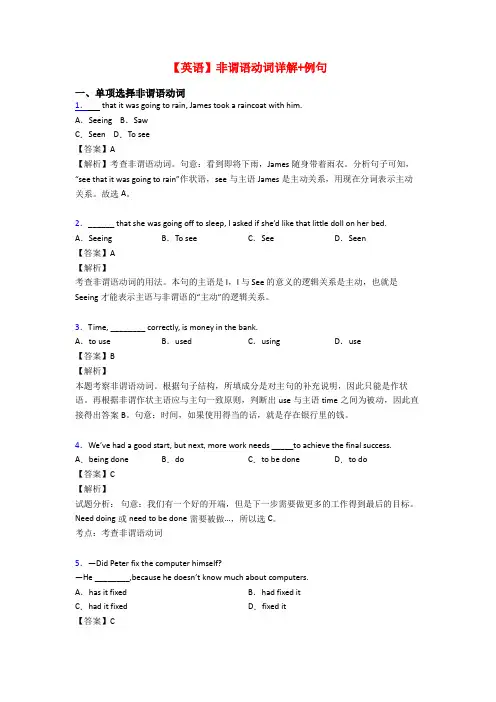
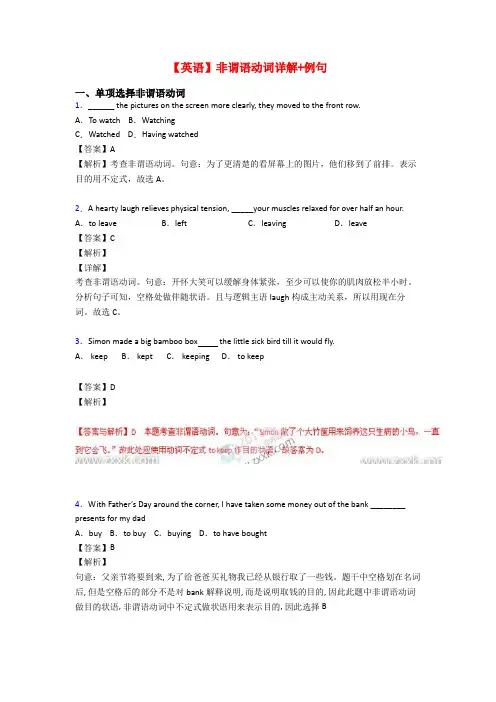
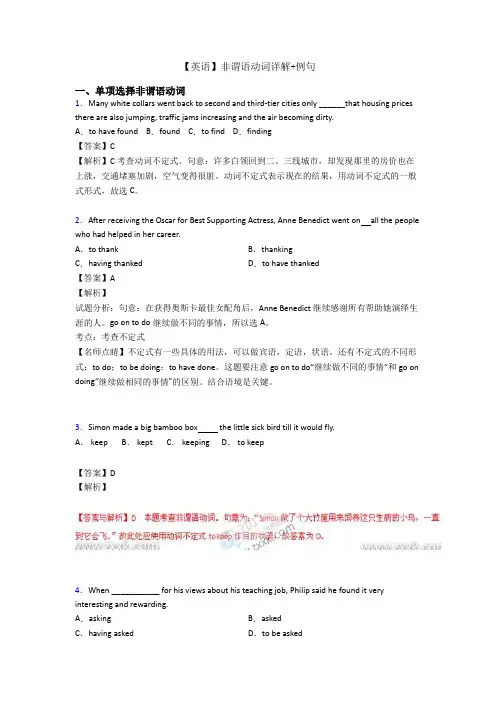
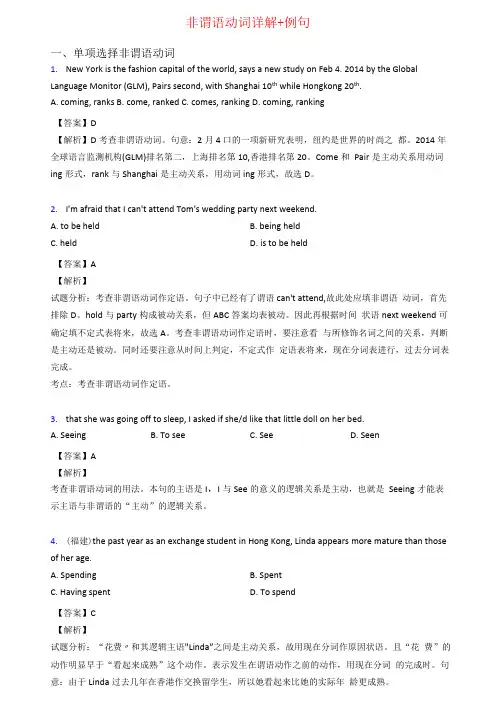
非谓语动词详解+例句一、单项选择非谓语动词1.New York is the fashion capital of the world, says a new study on Feb 4. 2014 by the Global Language Monitor (GLM), Pairs second, with Shanghai 10th while Hongkong 20th.A. coming, ranksB. come, rankedC. comes, rankingD. coming, ranking【答案】D【解析】D考查非谓语动词。
句意:2月4 口的一项新研究表明,纽约是世界的时尚之都。
2014年全球语言监测机构(GLM)排名第二,上海排名第10,香港排名第20。
Come和Pair是主动关系用动词ing形式,rank与Shanghai是主动关系,用动词ing形式,故选D。
2.I'm afraid that I can't attend Tom's wedding party next weekend.A. to be heldB. being heldC. heldD. is to be held【答案】A【解析】试题分析:考查非谓语动词作定语。
句子中已经有了谓语can't attend,故此处应填非谓语动词,首先排除D。
hold与party构成被动关系,但ABC答案均表被动。
因此再根据时间状语next weekend可确定填不定式表将来,故选A。
考查非谓语动词作定语时,要注意看与所修饰名词之间的关系,判断是主动还是被动。
同时还要注意从时间上判定,不定式作定语表将来,现在分词表进行,过去分词表完成。
考点:考查非谓语动词作定语。
3.that she was going off to sleep, I asked if she/d like that little doll on her bed.A. SeeingB. To seeC. SeeD. Seen【答案】A【解析】考查非谓语动词的用法。
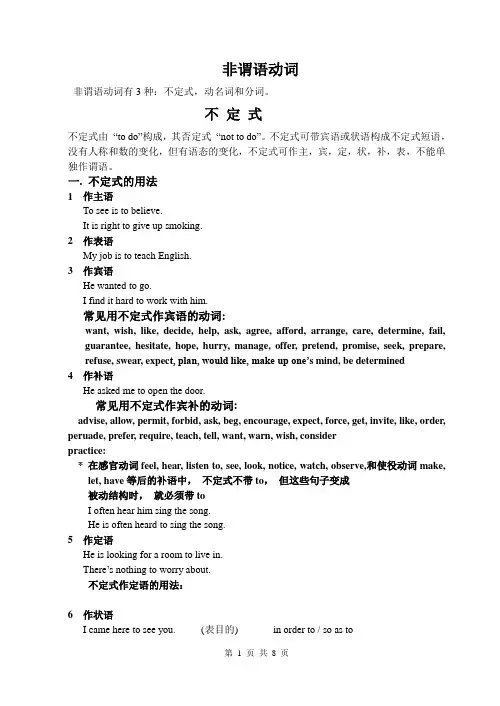
非谓语动词非谓语动词有3种:不定式,动名词和分词。
不定式不定式由“to do”构成,其否定式“not to do”。
不定式可带宾语或状语构成不定式短语,没有人称和数的变化,但有语态的变化,不定式可作主,宾,定,状,补,表,不能单独作谓语。
一. 不定式的用法1 作主语To see is to believe.It is right to give up smoking.2 作表语My job is to teach English.3 作宾语He wanted to go.I find it hard to work with him.常见用不定式作宾语的动词:want, wish, like, decide, help, ask, agree, afford, arrange, care, determine, fail, guarantee, hesitate, hope, hurry, manage, offer, pretend, promise, seek, prepare, refuse, swear, expec t, plan, would like, make up one’s mind, be determined4 作补语He asked me to open the door.常见用不定式作宾补的动词:advise, allow, permit, forbid, ask, beg, encourage, expect, force, get, invite, like, order, peruade, prefer, require, teach, tell, want, warn, wish, considerpractice:* 在感官动词feel, hear, listen to, see, look, notice, watch, observe,和使役动词make, let, have等后的补语中,不定式不带to,但这些句子变成被动结构时,就必须带toI often hear him sing the song.He is often heard to sing the song.5 作定语He is looking for a room to live in.There’s nothing to worry about.不定式作定语的用法:6 作状语I came here to see you. (表目的) in order to / so as toWe were excited to hear the news. (表原因)He hurried to the school (only) to find nobody there.(表结果7 疑问词+不定式,在句中起名词作用,可作主,宾,表He didn’t know what to say.How to solve the problem is very important.My question is when to start.8 作插入语To tell the truth, I don’t agree with you.to be sure to be frank to sum up to begin /start withto make matters worse to be brief二不定式的时态,语态1 一般式:表示的动作与谓语动作同时或在它之后发生He pretended not to know me when I met him in the street.2 进行式:表示动作发生时,不定式动作正在发生He pretended to be reading English when I entered the classroom.3 完成式:表示动作发生在谓语动作之前He is said to have learned English in Britain for a year.A railway is said to be being built now.No harm seems to have been done.四不定式的省略为避免重复可用to来代替前面的不定式,常出现在下列动词后expect, hope, wish, mean, prefer, care, forget, want, try 或出现在be glad, be happy, would like/love后eg: I haven’t been to Hong Kong, but I wish to.--- Would you come to the party?--- I’d love to, but…如果在省略不定式中含有be, have, have been 等系动词或助动词,这些词要保留。


非谓语动词作表语例句1. 我的习惯是打盹,打盹的时候我就像一只慵懒的小猫,打盹(动名词作表语)是我放松的方式。
2. 她的梦想是飞翔,仿佛自己是只自由自在的小鸟,飞翔这个动作(动名词作表语)在她心中充满了无尽的诗意。
3. 我的噩梦是爬高楼,那感觉就像一只小蚂蚁要去征服珠穆朗玛峰,爬高楼(动名词作表语)对我来说是极其恐怖的事。
4. 他的工作是扫地,他扫起地来就像一阵龙卷风席卷而过,扫地(动名词作表语)被他干得风风火火。
5. 她的特长是唱歌,一唱歌就像百灵鸟开了嗓,唱歌(动名词作表语)的时候她整个人都在发光。
6. 我的癖好是收集树叶,我收集树叶的时候就像一只松鼠在囤积过冬的粮食,收集树叶(动名词作表语)让我乐此不疲。
7. 他的习惯是熬夜,这熬夜就像跟黑夜做一场无尽的谈判,熬夜(动名词作表语)成了他生活的常态。
8. 她的喜好是画画,画画的时候她就像一个拥有魔法的仙女,画笔就是她的魔法棒,画画(动名词作表语)能让她创造出奇妙的世界。
9. 我的爱好是读书,读书的时候我就像一个贪婪的小书虫钻进了知识的海洋,读书(动名词作表语)是我生活中最美妙的事情。
10. 他的技能是做饭,做饭时他就像一个美食界的魔法师,做饭(动名词作表语)的过程充满了神奇。
11. 她的兴趣是跳舞,跳舞的时候她就像翩翩起舞的蝴蝶,跳舞(动名词作表语)让她看起来美极了。
12. 我的日常是跑步,跑步的时候我感觉自己像一阵风,跑步(动名词作表语)让我充满活力。
13. 他的本事是修东西,修东西的时候他就像一个万能的工匠,修东西(动名词作表语)对他来说易如反掌。
14. 她的追求是写作,写作的时候她就像一个孤独的探险家在文字的世界里冒险,写作(动名词作表语)是她表达自我的方式。
15. 我的乐趣是下棋,下棋的时候我就像一个指挥千军万马的将军,下棋(动名词作表语)充满了策略与智慧的较量。
16. 他的特长是游泳,游泳的时候他就像一条灵活的鱼,游泳(动名词作表语)是他最擅长的运动。
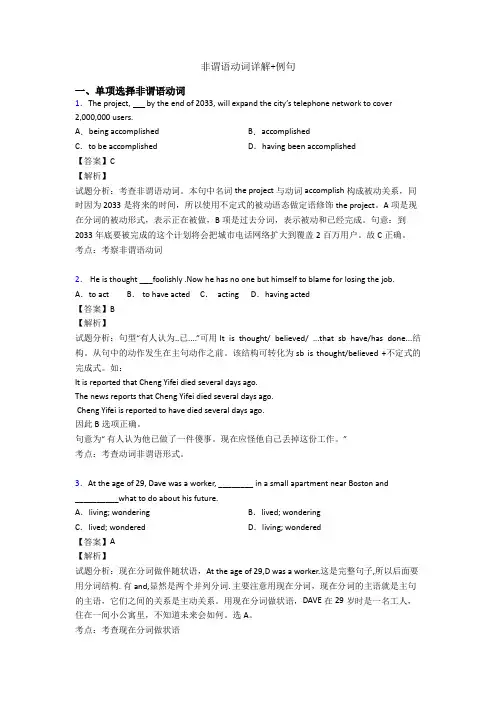
非谓语动词讲解以及例句非谓语动词是指动词的非谓语形式,不受主语的人称和数的限制,常用作句子的宾语、定语或状语。
非谓语动词包括动名词、不定式和分词三种形式。
一、动名词(-ing形式):1. 作主语:Being kind to others is always a good thing to do.(对他人友善总是值得做的好事。
)2. 作宾语:I enjoy swimming in the ocean.(我喜欢在海里游泳。
)3. 作宾补:She made a decision, ending their relationship.(她做出了一个决定,结束了他们的关系。
)4. 作定语:The running water is so clear and refreshing.(流动的水非常清澈和令人神清气爽。
)5. 作状语:Knowing the answer, he raised his hand.(知道答案后,他举手了。
)二、不定式(to + 动词原形):1. 作主语:To learn a new language is challenging but rewarding.(学习一门新语言是具有挑战性但值得的。
)2. 作宾语:She wants to visit Paris next year.(她想明年去巴黎旅游。
)3. 作宾补:I need to finish this report by tomorrow.(我需要明天之前完成这份报告。
)4. 作定语:He is the best person to ask for help.(他是寻求帮助的最佳人选。
)5. 作状语:She went to the library to study.(她去图书馆学习。
)三、分词:1. 现在分词(-ing形式):The crying baby woke up the entire neighborhood.(哭闹的婴儿吵醒了整个社区。
非谓语动词语法详解.一.主语.1. 动名词和不定式作主语时,都可以用it 作形式主语,构成句型:it +be +表语+to do /doing sth. 当用作表语的是important , essential, necessary , unnecessary, possible, impossible, easy , difficult 等表示客观情况的形容词时,常用不定式作主语;当用作表语的是no use, no good, useful, useless, worth, worth while, a waste of time 等表主观短语时,常用动名词作主语。
Eg: it is important for us students to learn english well.It is impossible for them to finish the work within two hours.It is no use arguing with him about the matter.I don’t think it’s much good writing to him.It’s a waste of time trying to persuade her to agree.2.动名词短语作主语时表示抽象动作,通常不与特定的动作执行者联系在一起;不定式作主语表示具体动作,往往与特定的动作执行者联系在一起。
Eg: lying is wrong. (泛指)To lies is wrong. (特指)It’s no use crying over split milk.He realized that it was no use to go on like this.二.. 非谓语作宾语1.1)Would you mind lending me your English dictionary for a while?2) She can’t help crying after she listened to the sad story .3) I suggested trying it in a different way .4) I ‘ve been looking forward to hearing from you for a long time.5) He insisted on finishing the work before going home.6) Upon returning from Beijing, he went to visit his friends.7) He took a great delight in helping others.8) he didn’t metion having met me .9) I still remember having ever worked with him .10) I enjoyed watching TV program in the evening.11) the car needs reparing .12) the problem deserves explaining .13) This phonomenon requires studying carefully.14) The book is worth reading We don’t allow smoking in the classroom.He dislikes seeing her again.Mary is considering going abroad.Have you finished checking these machines?Working conditions keep improving, and production keeps going up , as well. He really appreciates having time to relax.He is fond of learning English.She left without telling me.1) I need to fetch a tape from a friend2) do you want me to find one stamp for you ?3) I have arranged to meet here at 10:00.I’d prefer to walk there this morning.I’d hate to leave you like that .She’d like to chat with university students.扩:1) agree , afford , aim , apply , arrange, ask , choose, claim, decide, demand, determine, fail , hope , learn , offer, plan , pretend, promise, refuse, want 等后只用to do .2)admit , allow , appreciate , avoid , consider, deny , dislike, encourage,enjoy, escape , excuse, finish , forbid , imagine, keep , mind , permit , practice 等词后只用doing3)stop doing sth / to do sth 停止做某事/停下来去做某事remember doing sth/ to do sth. 记得做过某事/记住要去做某事forget doing sth/ to do sth 记了做过某事/ 忘了做某事regret doing sth / to do sth 后悔做过某事/ 遗憾地。